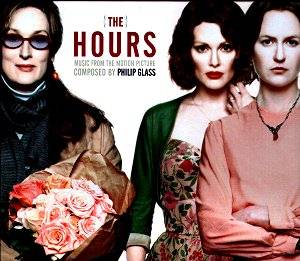This CD contains the
soundtrack music written by Philip Glass
for the celebrated film The Hours
(which I have not seen) which is based
on Michael Cunningham's novel of the
same name. It is atmospheric and fluid,
taking on a more "classical" feel than
much of this composer's work and there
are certainly none of the overt exoticisms/orientalisms
which colour much of his output. It
is also self-referential in that some
of the music is based on pieces featured
on earlier records (specifically Glassworks,
Satyagraha and even Solo Piano).
Although Glass has
never been one for real histrionics,
even by his standards The Hours
is pretty introverted and restrained,
perfect no doubt as a backdrop to the
story, in which Virginia Woolf and her
character Mrs. Dalloway loom large.
The aforementioned author of the film's
source work contributes a lucid and
affecting essay to the excellent booklet
(it also includes fairly meaty chunks
from each of the relevant sections of
the novel itself), describing not just
the genesis of the story but also music's
pivotal role in his own creative process
(Glass of course but also Peter Gabriel,
Neil Young and Radiohead are listed
as inspirations alongside Schubert,
Mozart and Verdi). Returning to the
music, it is still, as is always the
case with this composer, instantly recognisable,
the sweep of the strings, the arpeggiated
rhythms, it's all there, albeit in a
more sepia tone than normal.
Most commentators would
say that some of Philip Glass's best
music resides within his movie scores
but this one, while entirely pleasant,
often relaxing listening, does not have
as much of an independence (from the
film) as some of the others. There are
places where I am more reminded of his
Violin Concerto (minus the aforementioned
exoticisms) and I did occasionally find
myself listening in vain for some of
the vigour, even rawness of earlier
scores like North Star (my first
point of contact with Glassmusic via
the cover version on Mike Oldfield's
Platinum!). Having said that,
the music is "cinematic" in the true
sense of the word and therefore achieves
its primary purpose. The piano is used
a great deal, echoing perhaps the author's
debt to Schubert, when writing the original
novel, and, to be fair, the emotional
level does intensify as we get towards
the end of the disc, mirroring developments
in the story. The best music is reserved
for Choosing Life and The
Hours itself, the former achieving
a genuine poignancy, the latter doubly
so, both characterised by comforting
if melancholy washes of strings, augmented
by understated, hymnal piano chords
and, finally, more percussive keyboard
sounds (systems music by harpsichord?).
In the absence of having
seen the film, the music does make more
sense if you read the novel excerpts
first (or indeed the novel if you have
time) - certainly the individual track
titles are quite easy to follow once
you have done so but the disc is still
a must have for Glass fans, minimalists
and film soundtrack buffs. I enjoyed
it but it isn't quite compulsive enough
to make me want to return to it regularly.
Neil Horner



